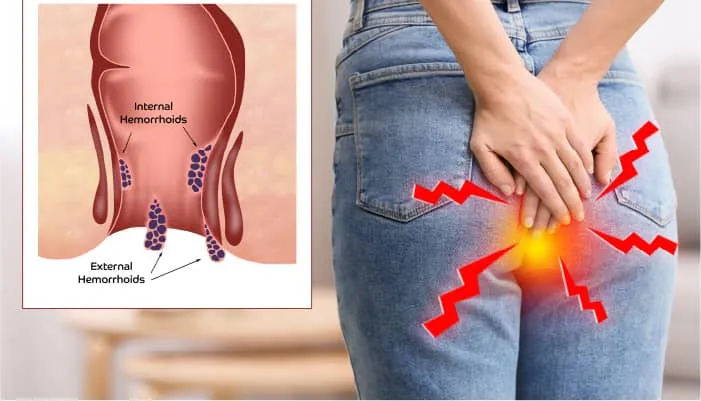Piles: Causes and Surgery
November 11, 2022
People are often looking for a permanent solution for piles. Being aware of the causes can help eliminate the problem in the long run. Doctors can also help with treatment options such as a diet or surgery after careful examination.
What are piles?
Haemorrhoids, commonly known as piles, is a condition that causes veins, around the inner or outer region of the anus, to bulge. When haemorrhoids or clots form on the inner lining of the rectum and anus, it is called an internal haemorrhoid. When haemorrhoids form on the outer lining of the anus, it is termed external haemorrhoids.
Symptoms of piles include:
-
Blood in feces
-
Pain and tenderness around the anus
-
Itching around the anus
-
Prolapse or hanging out of recta or anal tissues
Causes of piles
Piles can be caused due to various reasons, including:
-
Straining during bowel emptying
-
Constipation
-
Pregnancy
-
Obesity
-
Low fibre diet
-
Sitting for long hours
-
Frequent lifting of heavy weights
-
Anal intercourse
Diagnosis of piles
Piles can be diagnosed by a physical examination and a digital rectal exam that helps the doctor see the anus and rectum through a scope.
-
Physical examination: The doctor will examine the anus and surrounding tissues for lumps, swelling, fissures and bulging veins.
-
Digital rectal examination: Gloved fingers are used to feel the inner lining of the rectum and anus for anal fissures, lumps, prolapse of rectal tissue and any other signs that may help to identify the cause of piles.
-
Sigmoidoscopy: A scope (a long tube with a camera at the tip) is used to view the lower part of the rectum.
-
Anoscopy: A plastic scope helps view the outer and inner parts of the anus.
-
Colonoscopy: If the anus and lower end of the rectum do not help the doctor find the cause of piles, a longer colonoscope is pushed inside the large intestines for a thorough examination.
Treatment options for piles
Patients can be cured of piles naturally but may need treatment when the symptoms cause discomfort and lead to complications. Some of the treatment options include:
-
Diet: A fibre-rich diet is advisable for people with piles. Sources of fibre include legumes like peas, peanuts, soy and chickpeas; whole grains; green vegetables like broccoli, sweet potato and cucumber; fruits like pears and bananas; and fluids. Staying hydrated is important too.
-
Medications: Over-the-counter pain medications may help relieve pain and discomfort. A doctor may help with medicines to reduce swelling and itching. Suppositories and ointments may be prescribed.
-
Medical procedures: A rubber band ligation procedure is done to cut off the blood supply to the haemorrhoids. Sclerotherapy may also be conducted where certain chemicals are injected into the anus that helps reduce the piles' size.
-
Laser surgery: A proctologist or Colorectal surgeon will use laser radiation to burn and shrink the size of haemorrhoids by cutting off the blood supply. This is a minimally invasive procedure and requires a few hours of hospitalisation. Diet after a piles surgery needs to include fibre-rich foods.
-
Coagulation therapy: Heat or electric currents cause scar tissue formation in the haemorrhoids, which reduces or cuts off blood supply to the haemorrhoids leading to a reduction in their size.
It is advisable to consult a piles specialist to learn about the best treatment option.
Recovery after laser surgery
-
Piles laser surgery recovery time includes 24 hours of hospitalization.
-
Patients are instructed to rest for a day or two after piles surgery post which all activities and work can be resumed.
-
A diet rich in fibre and fluids is the best home remedy for constipation after surgery.
-
Any signs and symptoms of complications like extreme pain, constipation and bleeding must be shared with the doctor immediately.
-
The passage of stools may cause discomfort initially but becomes smooth within a couple of days.
-
Adequate hygiene needs to be maintained concerning anal cleaning, warm wipes and wearing comfortable underclothing.
Piles are treatable!
Haemorrhoids or piles are treatable conditions. Most cases can be managed at home, but few need medical attention. Treatment options include medications to relieve symptoms along with a fibre-rich diet. A surgical approach may be used to treat big haemorrhoids that do not respond to conservative approaches. Piles laser surgery is affordable and the least invasive, with excellent results. Consult a doctor for a detailed overview of the best treatment option for piles.
Dr Sanjeev Kumar
MBBS,MD...
| Experience | : | 17 Years |
|---|---|---|
| Speciality | : | Gastroenterology |
| Location | : | Patna-Agam Kuan |
| Timings | : | Mon - Sat : 03:00 PM to 09:00 PM |
Dr Vijay Prakash
MD,DNB,MRCP...
| Experience | : | 30 Years |
|---|---|---|
| Speciality | : | Gastroenterology |
| Location | : | Patna-Agam Kuan |
| Timings | : | Mon - Sat : 09:00 AM to 03:00 PM |
Dr Deepak
MD,DNB...
| Experience | : | 7 Years |
|---|---|---|
| Speciality | : | Gastroenterology |
| Location | : | Patna-Agam Kuan |
| Timings | : | Mon - Sat : 11:00 AM to 06:00 PM |
Dr. Aditya Shah
MBBS, MD, DM (Gastroenterology)...
| Experience | : | 5 Years |
|---|---|---|
| Speciality | : | Gastroenterology |
| Location | : | Chennai-MRC Nagar |
| Timings | : | Tue, Thu & Sat : 06:00 PM to 07:00 PM |
Dr. M Barath Kumar
MBBS, MD (INT.MED), DNB (GASTRO), MRCP (UK), MRCP (EDIN)...
| Experience | : | 12 Years |
|---|---|---|
| Speciality | : | Gastroenterology |
| Location | : | Chennai-Alwarpet |
| Timings | : | Mon to Sat : 06:30 PM – 07:30 PM |
Dr. Ashwin Kumar Myneni
MBBS, MS, DNB...
| Experience | : | 12 Years |
|---|---|---|
| Speciality | : | Gastroenterology |
| Location | : | Hyderabad-Kondapur |
| Timings | : | Mon, Wed, Sat : 07:30 PM to 08:30 PM |
Most cases of piles can be managed at home with easy home remedies for piles, but few with worsening symptoms require surgery to remove the haemorrhoids.
Haemorrhoids of grade 3 and grade 4 variety need to be removed surgically by laser or coagulation methods.
A general surgeon or a colorectal specialist performs haemorrhoid surgery. The specialists are also known as proctologists.
Foods like dairy products, fried and salty foods, red meat, white flour and processed foods must be avoided.
Haemorrhoids do not lead to or cause cancer. They may show signs of bleeding and lumps though which may not necessarily be cancer.
Banana is a good source of pectin and resistant starch that are helpful in reducing symptoms of piles.
It may take approximately 1-2 weeks for you to recover from a pile's surgery.
NOTICE BOARD
CONTACT US
CONTACT US
 Book Appointment
Book Appointment








.svg)
.svg)
.svg)
.svg)








